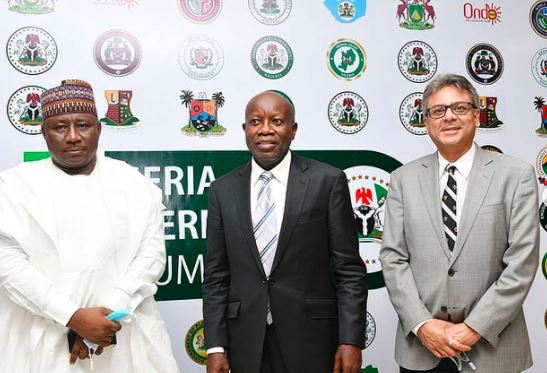Heads of Inland Revenue Service (IRS) of the 36 states of the federation on Monday gathered in the Federal Capital Territory (FCT), Abuja, to consider ways of adapting new technology and Innovations available to improve revenue collection in their various states.
This is even as the Nigerian Governors’ Forum (NGF) revealed that tax collected from contact-intensive taxes fell by an average of 40% across all states in Nigeria during the period of the lockdown.
The Secretariat of the Forum organized a programme tagged: NGF’s Technology and Tax event to help facilitate the scale up of modern, taxpayer-friendly, and technology-driven revenue administrations in all States of the federation that will be capable of providing world-class services; characterized by efficient, paperless operations, and equipped with ICT-enabled risk-based enforcement capable of optimising their revenue mobilization strategies.
Asishana Okauru, Director General of the Nigerian Governors’ Forum Secretariat, gave the hint at the NGF’s Technology and Tax event held in Abuja, noting that the figure came, as a result of research conducted by the Secretariat last year.
He said the result was a big lesson which exposed the criticality of internet-based business support systems and payment platforms for the automation of all back-end operational processes and payments across all revenue streams.
Okauru also noted that the lessons learnt from the research showed that most contact-intensive taxes are at risk, adding that all revenue administrations need to move to a digital future.
“Lessons of the COVID-19 pandemic have pointed to one direction – that all revenue administrations need to move to a digital future.
“Specifically for tax authorities, one big lesson that we have learnt is the criticality of internet-based business support systems and payment platforms for the automation of all back-end operational processes and payments across all revenue streams.
“From our research last year, we already know that most contact-intensive taxes are at risk, given the lessons we learnt during the period of the lockdown where taxes collected from contact-intensive taxes fell by an average of 40% across all States in Nigeria.
“Coupled with a weak environment for tax policy and tax legitimacy, low technological integration in tax administration has undermined efforts to mobilise domestic revenues in the country. This has undermined the capacity of tax authorities to collect taxes efficiently and the ability of taxpayers to meet their tax responsibilities conveniently” he said.
Also speaking, Mohammad Nami, the Chairman, Federal Inland Revenue Service (FIRS), who stressed the need to look inwards on how to improve the revenue of the states to augment the shortfall of allocations from the Federation Account, insisted that taxation all over the world has always been the most reliable and sustainable source of government revenue if well harnessed and effectively administered.
Nami regretted that the reliance on oil revenue in the previous years has exposed the country to huge revenue challenges and resulted in poor budget implementation across thethree tiers.
The FIRS boss noted that proffering solution for the nagging revenue challenges requires a deliberate strategic action plan.
Also, speaking representative of the World Bank at the programme, Mr Shubham Chaudhuri, said the road to technology adoption by tax administration is critical.
According to Chaudhuri, COVID-19 exposed the fact that digital systems is very important for effective tax administration and compliance
“What COVID-19 has shown us is that the compliance of digital systems is important.”
By Chidi Ugwu,
The Independent



